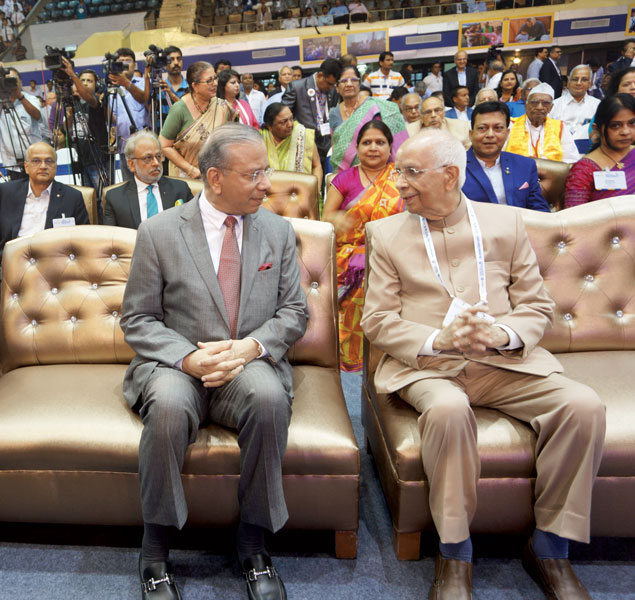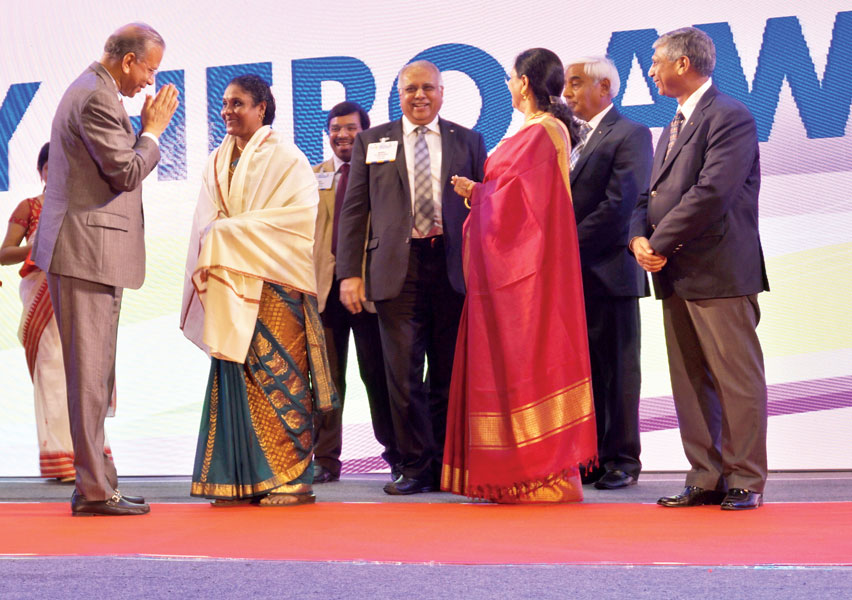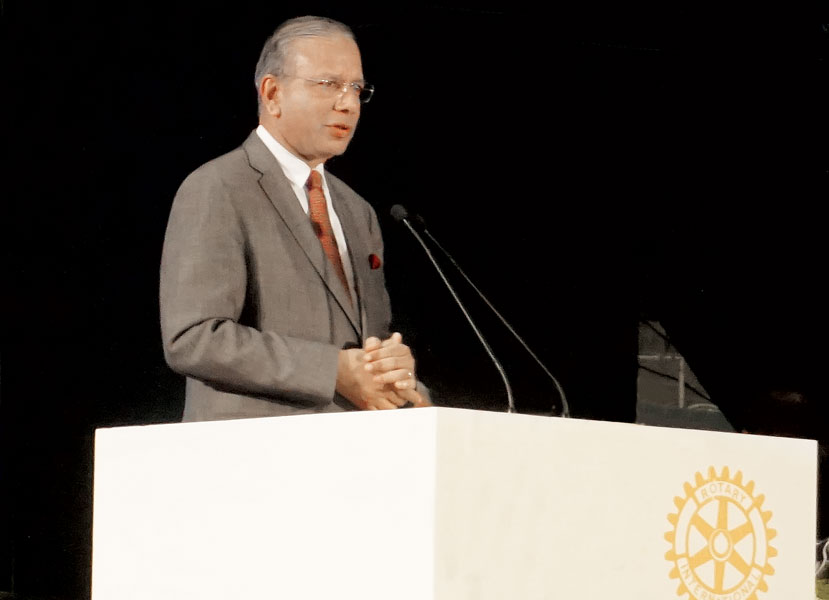Rotary can give India the eternal gift of literacy Polio is history in India; now to eradicate illiteracy, India also needs sanitation, ingenuity, dedication and expertise … needs that Rotary can provide, says RI President K R Ravindran.

The chances of a child getting educated in India are tremendously dependent on the accident of birth; “whether you are male or female, where you are born, what caste you are born into, what your family’s resources are like, and so on,” said RI President K R Ravindran, addressing the Rotary Presidential Conference on Literacy and WinS in Kolkata.
Among the factors that stopped children from going to school were … the walk being too long, the child not having shoes, water which had to be fetched, the baby at home who needed to be looked after. “But the single most effective, efficient and powerful way to move an entire country forward is to educate and empower its women,” he said, quoting from the new Sustainable Development Goals (SDGs) endorsed by the UN, and where the UNDP Administrator Helen Clark said that equality for women was not just one of the 17 goals: it was a prerequisite to all of them.
Him Jyoti says: No, you will not be limited by poverty, by caste, by the fact that you are a girl. If you have the brains and the motivation, you can succeed.
Child mortality was also closely linked to women’s education. “For every year of a girl’s education — and this is global, not just here in India — the chances of her future child dying before the age of five is reduced by 10 per cent.” Improvement in women’s education was responsible for half of the reduction in child deaths between 1990 and 2009.
If you want to improve the health and education of an entire generation, you need women who have, not only income, but control over household spending—because it is women who will prioritise food and education for their children above every other expense. Education was often called the “social vaccine,” because educated people knew how to protect themselves. The success of every development goal was linked to equality for women,” he said.
And Rotary India’s Wash in Schools programme was striving to do just that by giving girls equal opportunities as boys in getting education.
Lauding RILM’s efforts in sending children back to school, Ravindran said only 74 per cent of India was literate, and 26 per cent of a population of 1.25 billion was a huge number — “much larger than the population of most large countries. We could have said that this is simply beyond us to even get started on. We could have said universal literacy? Forget it, this will never happen. But look at what you’ve done. You thought otherwise. You have set out on a course to give full literacy to India.”
However daunting this challenge, Indian Rotarians could take heart from the fact that this had been done in even “more challenging circumstances.”
In China, as recently as the 1940s, the literacy rate was akin to India’s — somewhere between 15-25 per cent. By 1990, this had gone up to 78 per cent and today it stood at over 95 per cent. More impressive was the literacy rate among China’s 15–24 age group — 99.6 per cent! “That is the kind of rate we see in western developed countries, in Europe and the US.”
China had a bigger challenge; it was larger in size than India, with a population that was even more remote and mobile than in India. “Their writing system is far more complex, based not on an alphabet but on thousands of unique characters. But they achieved this feat because it was made a national priority, not just at the top level but at every level, right down to local government.”
India has made progress on literacy, which was only 12 per cent when the British left in 1947 and three per cent at the end of the 19th century.
Making it a matter of “national pride,” China trained armies of teachers; set up rewards for local administrators to meet targets, and empowered regional governments to get the desired results.
Reverting to India he said there was no need to lose heart. India has made progress on literacy, which was only 12 per cent when the British left in 1947 and three per cent at the end of the 19th century.
Ravindran said that in much of the developing world, including India, the work of literacy begins with water, sanitation and health, and clearance of obstacles that come in the way of the child being in school. In this context, he recalled his visit to the Him Jyoti School put up in Dehradun by PRID Sudarshan Agarwal, where 267 girls — the daughters of “dhobis, ayahs, farm labourers, book-binders and rickshaw-pullers” get excellent quality education.

“Here, the girls are taught in English, even though most of them come with no English at all.
So they must learn it. And they do learn it, along with Maths, Hindi, history, dance, drama — everything at the most demanding level.” During his visit, they enacted a skit from Shakespeare’s The Merchant of Venice and he was bowled over by its “beautiful presentation. These girls are equipped now, to go out into the world; Him Jyoti has graduates studying at Lady Shri Ram College, IP College and the Government College for Girls at Chandigarh. All of their graduates go on to higher education.”
The RI President said this could not be dismissed as a “handful of girls” getting such a benefit, because “these girls are moving beyond the expectations laid out for them by generations, by centuries of poverty.” Expectations that put the circumstances of one’s birth over her abilities. “Him Jyoti turns that on its head; says no, you will not be limited by poverty, by caste, by the fact that you are a girl. If you have the brains and the motivation, you can succeed.”
This was the exact goal that Rotary was striving for through WASH in Schools, and the opportunities provided were “helping families break free of illiteracy, poverty and the cycle that traps so many for generations. Remember that every school that is being equipped with sanitation; every school that is being brought up to standard; every one that gains the infrastructure to support girls in their education, is setting a generation free.”
Prime Minister Narendra Modi’s Swachh Bharat Abhiyan required commitment from individuals who know the local challenges and obstacles and how to overcome them. What was required to eradicate illiteracy from India was the same “spirit which allowed us to conquer polio.” Ravindran recalled that when he was a TRF Trustee, not many years ago, some of his fellow Trustees were skeptical about India conquering polio. “They talked about the terrain, the remote areas, the mobile populations and the poverty. They talked about the birth rates, the number of children born each week in UP alone. They shook their heads and wondered if perhaps India had taken something on that was simply beyond her.”
And finally, they said Rotary would get there eventually, but India would be the last country with polio. “India proved them wrong. You proved them wrong. With creativity, ingenuity, dedication and resilience — you proved that you knew your capabilities, and your country, better than anyone else.”
Now at this moment “India needs sanitation, literacy, ingenuity, resourcefulness, dedication and expertise … it needs, again, what Rotary can provide.” And when Rotary does meet these challenges for building a better, healthier and more prosperous India, “it will be one of your eternal gifts to India,” concluded Ravindran.
Pictures by Rasheeda Bhagat

